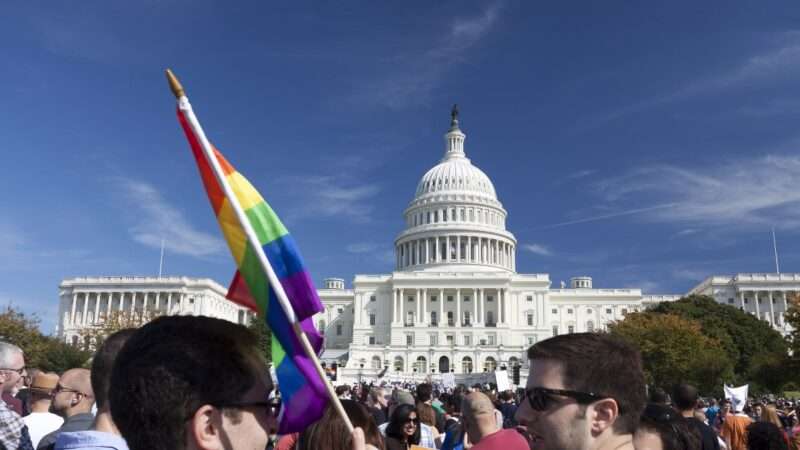
The House voted Thursday, 224-206, to approve the Equality Act, which would add gay and transgender protections to federal civil rights laws. It passed with almost no Republican support, meaning it probably cannot reach the 60 votes needed to survive a Senate filibuster.
H.R. 5 would add sexual orientation and gender identity to various parts of the Civil Rights Act of 1964 and the Fair Housing Act to cover public accommodations, education, jury service, employment, and similar preexisting categories.
If that’s all the Equality Act did, it would probably still face some opposition, but shifting attitudes toward LGBT issues have resulted in the general public largely supporting protections. But there’s more to the bill than this. There are two components that seemed designed to alienate many conservatives and libertarians.
First, the part getting much less news coverage: The Equality Act dramatically increases what is considered a public accommodation under federal law to cover just about every single consumer business. When the Civil Rights Act was crafted, lawmakers carefully focused on the venues where blacks had historically faced discrimination—restaurants, hotels, gas stations, et cetera. H.R. 5 expands what counts as a “public accommodation” law to any “establishment that provides a good, service, or program.” Many of these businesses are already subject to broad state-level anti-discrimination laws. Now they’ll also have to worry about the feds.
But second, the poison pill that is designed to feed the culture war: The Equality Act forbids the use of the federal Religious Freedom Restoration Act (RFRA) as a defense against claims of discrimination. You will make the cake. You will prepare the bouquets. You will take the photos, even if you hold religious objections to same-sex marriage.
This extremely uncompromising approach to government authority is intended to foment a culture war, not establish a liberty-minded policy prescription that protects both LGBT people and religious freedom. It’s worth noting that the RFRA is not just some magic spell to be invoked that allows people to wave a Bible (or another religious book) and then ignore the law. It was passed with overwhelming bipartisan support in 1993 to preserve a federal test that requires government officials to show that when a law burdens somebody’s expression of religious freedom, it does so in the furtherance of a compelling government interest and that it does so in the least restrictive way possible.
But the Equality Act now simply eliminates the test for these discrimination claims. It’s easy to see why people with deeply held religious beliefs see it as an attack.
The Equality Act passed the House once before, in 2019, but went nowhere in the Republican-controlled Senate. It actually picked up support from eight Republican representatives in 2019 and Sen. Susan Collins (R–Maine) said she would back it. But in Thursday’s vote, only three Republicans joined the effort, and Collins has now withdrawn her support.
What changed? Well, for one, the Supreme Court ruled in June that LGBT workplace discrimination violated the Civil Rights Act in a 6-3 decision that “sex discrimination” covers sexual orientation and gender identity. That ruling hit one of the biggest top-of-mind LGBT concerns. Presumably, that ruling will filter to other references of sex discrimination in the Civil Rights Act, though a law officially declaring it so would not be out of line.
Collins was approached by a Washington Blade reporter a few days before H.R. 5 passed the House and she explained that her previous sponsorship of the bill was contingent on changes being made. Those revisions apparently did not occur, and interestingly, Collins’ office said there’s been no outreach to her, despite her record of being an LGBT rights supporter.
There is a compromise bill that would expand federal discrimination protections to LGBT people without attempting to alienate religious people and force them to take actions they object to. The Fairness for All Act, introduced by Rep. Chris Stewart (R–Utah) would provide some specific exemptions for religious institutions, religious nonprofits, and small businesses while still adding sexual orientation and gender identity to federal discrimination laws.
I noted the bill back in 2019 and the reality that neither religious conservative organizations like the Alliance Defending Freedom, nor LGBT lobby groups like the Human Rights Campaign, want anything to do with it. But given the state of the culture war right now, the Equality Act probably cannot pass. And to be cynical, the law doesn’t seem designed to pass. It seems designed to be divisive for political purposes, to be used to request political donations, and to rally the base. Equality Act co-sponsor Sen. Jeff Merkley (D–Ore.) hinted he’d like to use the bill as a way to try to dump the filibuster.
Brookings Institution Senior Fellow Jonathan Rauch took to The Washington Post to beg LGBT groups to seriously think about allowing religious compromises if they want to get a bill passed. A similar compromise in Utah seems to have been successful:
The biggest prize would be the consolidation of public support for LGBTQ equality. Perhaps counterintuitively, LGBTQ civil rights protections enjoyed 77 percent support in conservative Utah in 2019, a level exceeded at the time only in New Hampshire. That’s because the 2015 compromise spanned traditionally adversarial lines. “I think the animosity has gone away,” said J. Stuart Adams, a conservative Republican and president of the Utah state Senate. “An amazing thing happens. When you reach out and try to protect the rights of someone you don’t necessarily agree with, they are less likely to try to take away yours.”
But all that requires you to want to protect both LGBT folks from discrimination and also preserve religious liberty and not pit the two groups against each other for your own political purposes. America does not seem to be in such a place right now.
from Latest – Reason.com https://ift.tt/2ZWyNns
via IFTTT